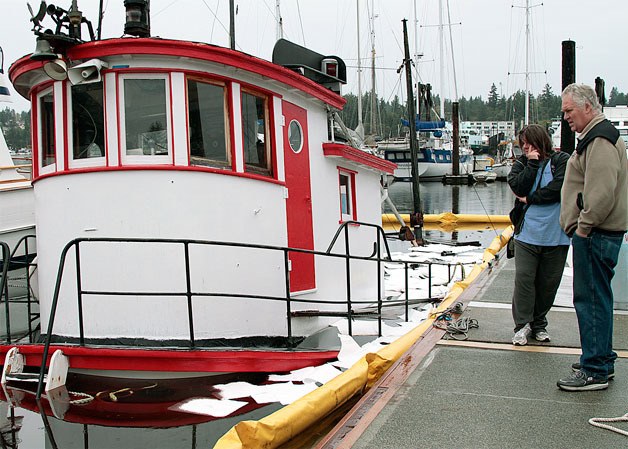It wasn’t the payback state officials had hoped for, but a Kitsap County Superior Court judge still said the owner of a historic tugboat that sank in Eagle Harbor three years ago must pay most of the state’s clean-up costs in refloating the vessel and scooping up hundreds of gallons of fuel that escaped into the harbor.
The tugboat Chickamauga, a 100-year-old vessel designed by famed boat designer L.E. “Ted” Geary that was once on the Washington Heritage Register, sank at its mooring spot at the Eagle Harbor Marina in October 2013 and spilled between 200 to 300 gallons of diesel fuel into the harbor.
Earlier this week, Superior Court Judge Jennifer Forbes ordered Anthony R. Smith, the former owner of the tug, to pay the state $44,616 in restitution to cover the costs incurred by the state Department of Natural Resources and the state Department of Ecology for the cleanup, removal and dismantling of the derelict ship.
Smith, who was not present at Monday’s hearing, had pled guilty in July to the misdemeanors of allowing a vessel to become abandoned or derelict and discharging polluting matter into state waters.
As part of a plea deal, Smith served 20 days in home detention in August and will spend the next two years on probation.
In exchange for Smith’s guilty plea, prosecutors with the state Attorney General’s Office agreed to drop first-degree theft charges that were based on Smith’s alleged failure to pay moorage fees for more than six months while the Chickamauga was moored at the Eagle Harbor Marina.
State officials had earlier hoped to make Smith pay a total of $54,292 in cleanup costs and related charges.
In court earlier this week, Stan Glisson, Smith’s attorney, raised questions over apparent incomplete and confusing billing statements that had been submitted by Global Diving & Salvage, the Seattle company hired to raise the Chickamauga and dispose of the vessel.
Glisson also claimed that restitution should be limited because there wasn’t a “victim” in the sinking of the vessel, and also argued that Smith wasn’t the actual owner of the old tugboat.
Instead, Glisson said, the owner of the Chickamauga when it sank was actually Smith’s ex-wife, who received the tugboat in their divorce settlement years before.
He also questioned whether Smith should be on the hook for paying for the vessel to be towed to Port Townsend, plus the costs of storing the ship there and then its dismantling.
Smith’s restitution costs should end at the point the tugboat was raised from the bottom of the harbor, he said.
From the time the ship is up and floating again, Glisson said, the costs should be “out of Mr. Smith’s hands.”
Assistant State Attorney General Joshua Choate disagreed about the lack of a victim in the case.
“The taxpayers are really the victim here,” Choate said.
The vessel sank in state waters, he said, and Choate added that there was no doubt that Smith was the actual owner of the boat.
It was Smith who brought the old tug to Bainbridge Island from Ballard, Choate recalled, and it was also Smith who filled out an application to moor the vessel in Eagle Harbor and then “ditched it” at the Eagle Harbor Marina.
“Mr. Smith was in control of the boat; he was the owner of the boat,” Choate said.
What’s more, in Smith’s divorce with his wife, he actually agreed to sell the vessel and share the proceeds with his former spouse, Choate said.
“She didn’t want this boat; she didn’t want anything to do with the boat,” Choate said.
The state also wasn’t overreaching, he said, in asking Smith to pay for costs beyond cleaning up the pollution caused by the Chickamauga’s sinking. The salvage company’s involvement with the derelict tugboat didn’t end when it was floating again.
“They have to do more than scoop up the oil and pick it off the bottom of the sea,” Choate said.
Forbes, who noted that she had dealt with derelict vessels earlier in her career during her time as a city attorney, agreed.
She said Smith would pay $44,616 in restitution; $42,338 to the Department of Natural Resources for raising and removing the Chickamauga, and $2,278 to the Department of Ecology for diesel fuel cleanup.
Though the amount was less than what the state sought, Forbes said the state could submit a supplemental restitution request once questions on the invoices were resolved.
Glisson hinted that Smith has had financial troubles in recent times, however, and noted he had declared bankruptcy in the past year.
Forbes then put Smith on a payment plan, and the judge said he would be responsible for $500-a-month payments starting Nov. 1.
Attorney General Bob Ferguson praised the ruling and noted it was the third derelict vessel case the state has pursued since 2014.
“If you damage our environment, you will be held accountable,” Ferguson said in a statement. “Derelict vessels are a serious threat to our waterways, and the damage they cause has a cost, both ecologically and financially.”
“Sadly, the boat sinking and spill were preventable,” added Dale Jensen, Ecology’s Spills Program manager. “Mr. Smith chose to neglect his vessel, and ended up causing a significant spill. Our spill responders, along with the Coast Guard and Department of Natural Resources, responded and worked hard to clean up the mess.”



